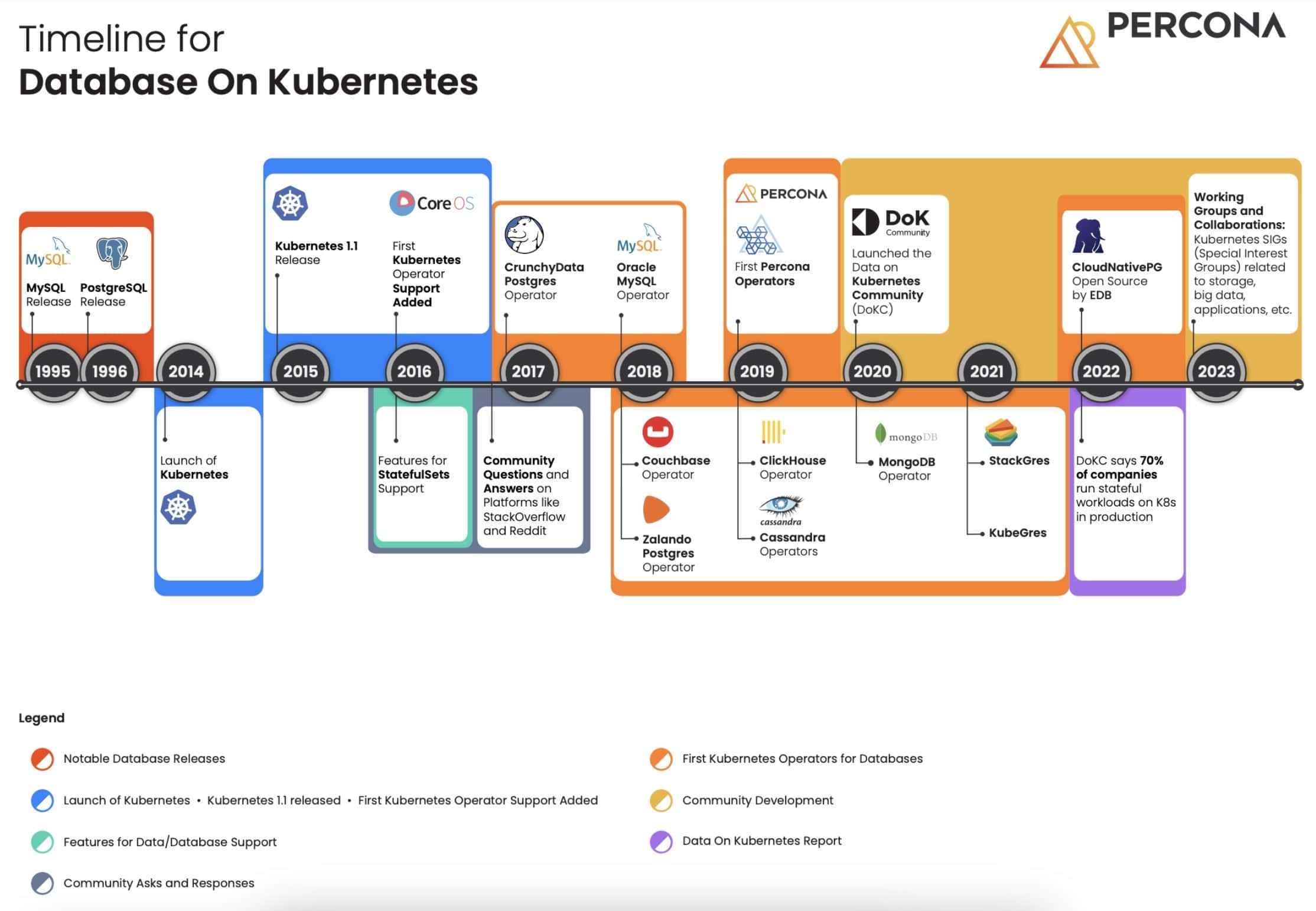Ambassador post by Edith Puclla, CNCF Ambassador and Tech Evangelist at Percona
Since its launch in June 2014, Kubernetes has revolutionized container orchestration, transforming how applications are managed and scaled. The Data on Kubernetes Community (DoKC) created an infographic to celebrate Kubernetes’ tenth anniversary and highlight key milestones and community contributions to the evolution of operators for managing stateful applications. This infographic was made possible through the collaboration of several members of the DoKC: Sergey Pronin, Robert Hodges, Gabriele Bartolini, Chris Malarky, Mark Kember, Paul Au and Luciano Stabel.

Early Days and Key Developments
- 2014: Kubernetes was introduced by Google as an open-source container orchestration platform. The initial version 1.0 was released in July 2015, supporting stateless applications but not stateful workloads like databases.
- 2015: Kubernetes 1.1 brought performance upgrades and new features. However, data and storage management remained underdeveloped.
- 2016: CoreOS introduced the operator concept, significantly simplifying the deployment and management of complex applications, including databases on Kubernetes. StatefulSets were also introduced providing stable network identifiers and persistent storage which are crucial for database management.
Database Operators and Community Innovations
2017:
- CrunchyData Operator for PostgreSQL first release was in March 2017
2018:
- MySQL Operator: Launched by Oracle.
- Zalando Postgres Operator
- Couchbase Autonomous Operator.
2019:
- ClickHouse and Cassandra Operators were launched.
- Percona introduced its own set of Kubernetes Operators for managing Percona Server instances for MySQL and MongoDB, improving database management capabilities in Kubernetes environments.
2020:
- MongoDB Operator: Developed by MongoDB Inc.
2021:
2022
- CloudNativePG open-sourced by EDB
Community Growth and Collaborative Efforts
By 2020, the Data on Kubernetes Community (DoKC) was established with the main goal of collaboration and sharing best practices for running data-intensive applications on Kubernetes.
Later, the Kubernetes Special Interest Groups (SIGs) focusing on storage, big data, and applications emerged as key collaborative working groups. These groups have produced valuable resources, such as the Data on Kubernetes Whitepaper, produced in collaboration with the CNCF Storage TAG.
Adoption and Impact
According to the CNCF, 84% of organizations are either using or evaluating Kubernetes, and 70% run stateful applications on Kubernetes in production. More users and containers have been added over time, evidenced by an increased number of contributors, greater adoption of cloud-native technologies, and more use cases for handling stateful applications in Kubernetes.
Looking Ahead
As we celebrate a decade of Kubernetes, the integration of databases continues to evolve driven by community collaboration and technological advancements. A good example of this is Percona Everest. Percona Everest goes beyond being just a Kubernetes Operator for databases. It represents the future of databases on Kubernetes. It provides an easy way to run any type of database on Kubernetes clusters in the cloud and is completely open-source. Would you like to give it a try? Feel free to visit our GitHub repository and give us a star if you find it useful. For any feedback or comments, you can write to us in our Pecona Forum for Percona Everest.

For more details, explore the rich history and ongoing developments in the Kubernetes ecosystem at Data on Kubernetes Community and join the conversation for the future of database management on Kubernetes.